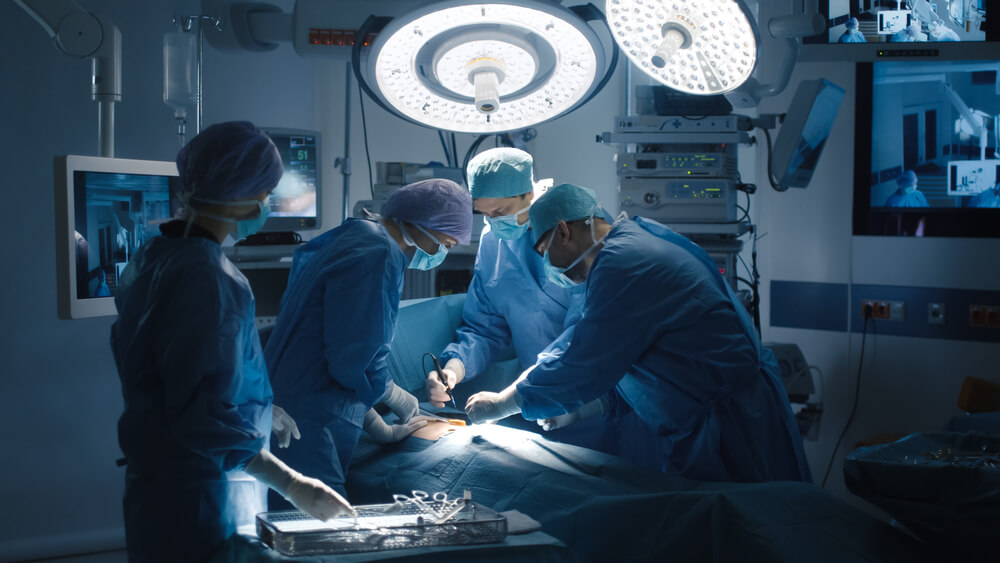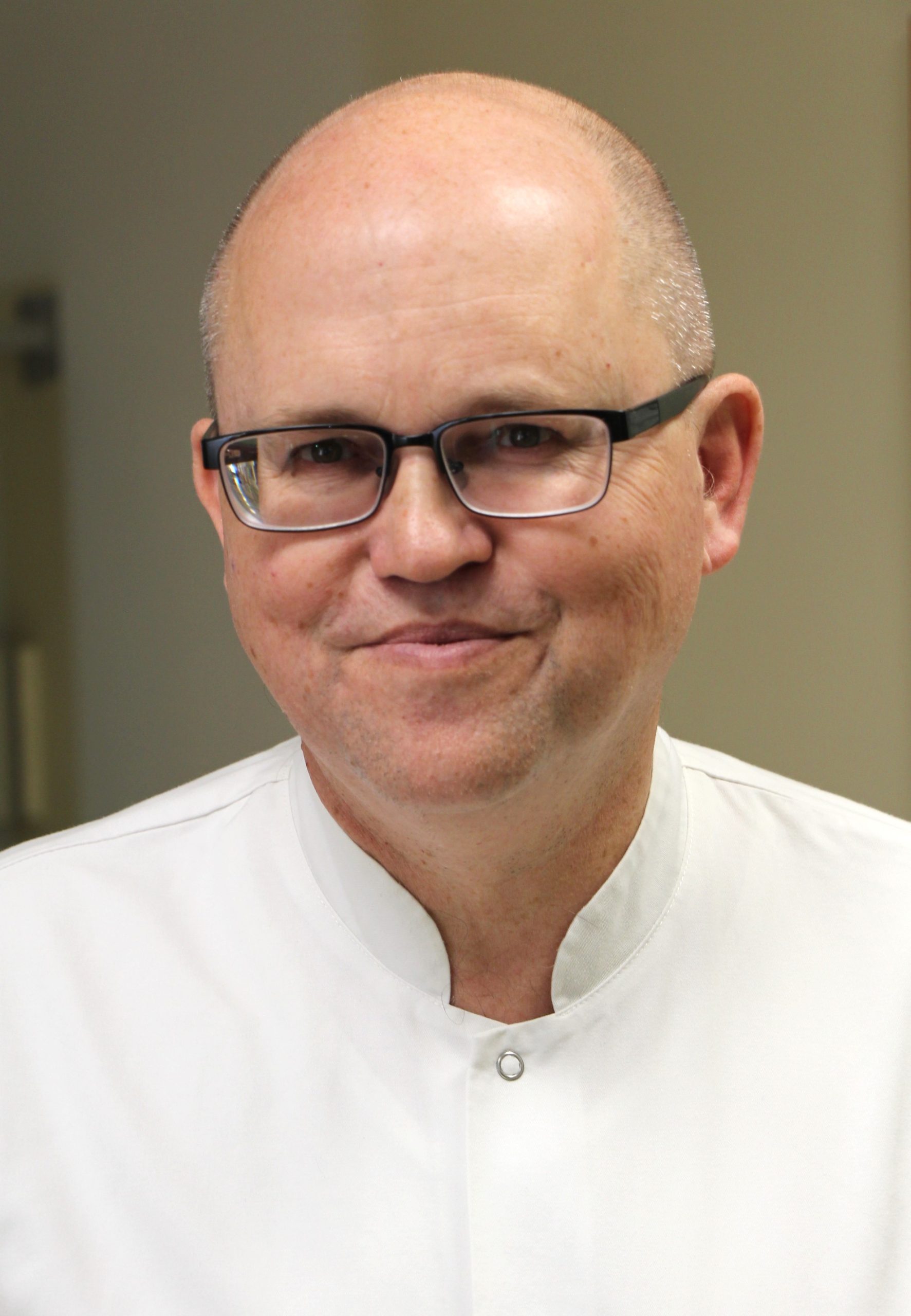Clinical Department of Oncological Surgery

The Oncology Centre in Bydgoszcz has the largest oncological surgery department in Poland, specializing in the treatment of colorectal cancer or the so-called colorectal cancer unit. Annually, we perform nearly 500 procedures on this section of the digestive tract. We also treat: cancer of the stomach, oesophagus, melanoma, tumours of liver and pancreas. We perform HIPEC and thermoablation procedures.
Modern surgery aims to minimize invasiveness. Laparoscopic procedures in the treatment of colorectal cancer are still rare in Poland. Meanwhile, in our hospital as much as 30 percent of surgeries is performed using this minimally invasive technique.
Laparoscopic procedures offer many benefits. Thanks to them, patients are much less prone to complications and recover faster. They undergo the procedure more gently, therefore they stay in hospital for a shorter time. They do not suffer. A patient can be discharged when digestive tract function returns. Usually it is the fourth or fifth day – after laparoscopic surgery, which is much shorter than with traditional surgery. In the case of the classic method, hospitalization takes about 8-10 days. What is extremely important, thanks to laparoscopic procedures, many patients manage to avoid a mutilating stoma. Performing ultra-low recto-intestinal anastomosis allows to preserve the sphincters in 85 percent of cases.
Depending on the type of tumour, the stage of its development and the patient’s condition, chemotherapy may be either the main therapeutic line for a given patient, or part of the treatment combined with radiotherapy and oncological surgery.
In some cases, it is possible to offer our patients voluntary participation in clinical trials of new drugs. These are phase II and III trials aimed at confirming the effectiveness of a preparation or combination of drugs in a specific type of cancer.


|
Department Coordinator
dr hab. n. med. Michał Jankowski, prof. UMK
|
|
Head of Medical Care
Marta Korecińska, MSc
|
- We deal with the treatment of colorectal cancer at all stages with the use of treatments available world-wide – we meet all the criteria of the COLORECTAL CANCER UNIT due to our experience and equipment.
- We perform laparoscopic procedures of the colon and rectum. Surgeries using the TEM method – endoscopic resection of small tumours using the microsurgical technique as well as HIPEC and thermoablation in the case of advanced colorectal neoplasms with metastases to the peritoneum and/or liver.
- We have extensive experience in treating tumours. Every year we operate hundreds of cases with good treatment results in terms of curability and 5-year survival, and quality of life – 70% of 5-year survivals.
- We provide gastric cancer treatment based on the mapping of the stomach and the lymphatic system with the PET-CT FLT technique, which gives improved treatment results.
Odwiedziny
- odbywają się codziennie w godzinach od 15.00-17.30,
- rekomenduje się wejście na oddział tylko 1 osoby odwiedzającej,
- osoby z objawami infekcji nie mogą odwiedzać pacjentów,
- przypominamy o obowiązku noszenia maseczki podczas całego pobytu w Centrum Onkologii
Przyjęcie do Oddziału
Izba Przyjęć znajduje się na niskim parterze w tylnej części Budynku Głównego. Z jej usług korzystają osoby skierowane do planowanej hospitalizacji oraz pacjenci leczeni w Centrum Onkologii, u których nastąpiło nagłe pogorszenie stanu zdrowia.
Pacjenci zgłaszający się do przyjęcia powinni mieć dowód osobisty lub inny dokument potwierdzający tożsamość.
Po rejestracji w Recepcji Izby Przyjęć chory udaje się do przebieralni, jeśli zachodzi taka potrzeba pielęgniarka/ sanitariusz pomaga choremu przy przebraniu się. Pacjent przekazuje okrycia wierzchnie rodzinie lub pozostawia je na przechowanie w depozycie szpitalnym. Na oddział docelowy chory udaje się sam lub jeśli zachodzi taka potrzeba jest zaprowadzony lub przewieziony przez sanitariusza Izby Przyjęć.
UWAGA!
Szpital nie ponosi odpowiedzialności za rzeczy pozostawione w szafkach przy łóżku chorego, dlatego też wszelkie wartościowe przedmioty (np. pieniądze, biżuteria, karty płatnicze) należy zostawić w domu lub przekazać do Depozytu Rzeczy Wartościsiowych mieszczącego się w Kasie Centrum Onkologii.
Co zabrać ze sobą do szpitala?
- leki oryginalnych opakowaniach + dokumentację medyczną + nagrania płyt z badaniami
- piżamę,
- ręcznik,
- kapcie, klapki pod prysznic,
- wygodne ubranie bawełniane np. dres,
- bieliznę osobistą,
- szlafrok,
- środki czystości (mydło, szampon, szczotkę i pastę do zębów, dezodorant)
- przybory toaletowe (grzebień, przybory do golenia itd.)
Co można zabrać:
- sztućce,
- kubek,
- wodę mineralną niegazową,
- kawę/herbatę,
- chusteczki higieniczne,
- środki higieny osobistej (podpaski),
- książki, czasopisma,
- telefon komórkowy + ładowarkę

